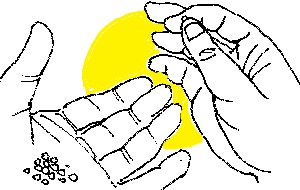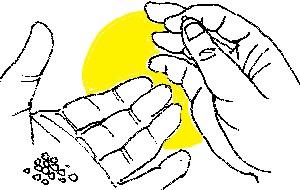

“This is how it is with the Kingdom of God” (Mark 4:26).
Heb 10:32-39; Mark 4:26-34
Who knows how many parables Jesus told? The synoptic Gospels preserved collections by theme. Luke and Matthew expanded some of them into short allegories that applied Jesus’ message to their own community issues later in the century, like the parables of the Wheat and Weeds or the Wedding Feast. Luke recreated some of Jesus’ most memorable parables with great literary skill, like the Good Samaritan and the Prodigal Son, unmatched among the passages that capture and convey the heart of the Gospel in the life of the early church.
Today, Jesus compares God’s reign to a farmer who is more witness than worker as nature delivers a harvest once the sowing is done. We do our small part and, behold, a great bounty is given. Or the mustard seed, smallest of all, once sown springs forth to become the largest of plants, providing branches and shade for nesting birds. The miracles of nature surround us, and so it is with God’s presence and care.
We hear in the parables echoes of Isaiah’s poetic descriptions of the return of flowers to the desert when the spring rains fall, or his reassurance to Israel that even in drought God’s word always accomplishes what it was sent to do:
For just as rain and snow fall from heaven and do not return without watering the earth, making it bud and sprout, providing seed to sow and food to eat, so my word that proceeds from my mouth will not return to me empty, but it will accomplish what I please, and it will prosper where I send it (Isa 55:10-11).
Jesus knew the Scriptures by heart, and many of his parables demonstrate the power of God’s word to create and increase life. Because he himself is the Word of God, each time he opens his mouth, Jesus becomes the sower going out to sow, grace upon grace flowing from him to his hearers. Wherever there are receptive minds and hearts, the Word of God germinates and multiplies its effects.
This is why we rise each day to let the Scriptures proclaimed throughout the universal church take root in us, renewing our personal intimacy with God. Pope Francis is up early to prepare his homily. We read the same words. They set the tone for the day, become part of us as we consume the news with our morning coffee and a determination to make a difference, however small, on life around us. Parables beget parables when we learn to see the meaning and imagery in ordinary experiences, the weather, the play of words in family life, at work, in the running commentary in our minds. Somehow, God finds a way to enter the conversation, show us things, ask us questions. Best friends, God and us. “This is how it is with the Kingdom of God.”
Advertisement




